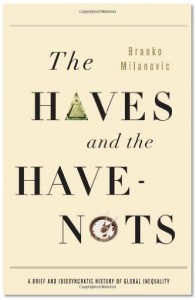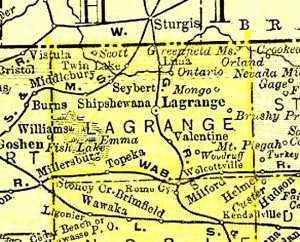I spent the previous post critiquing the idea of the “self-made man/woman,” but I should put in a word for the idea. After all, our decisions, work ethic and efforts count for something.
But how much?
Economists, actually, can figure this out.
According to Branko Milanovic, in a rather interesting (and readable!) little book entitled The Haves and the Have-Nots: A Brief and Idiosyncratic History of Global Inequality, this is how it works: take the actual incomes of everyone in the world and compare it to the mean incomes of their countries. The result of the global analysis that the nation where we were born determines 60% of what we have. Not only that, but the family one is born into within a given nation counts for an additional 20% of one’s wealth. (One might be born in Brazil, for instance, but there is a great difference between being born to the household of a professional businessman in Rio de Janeiro verses being born in a two-room shack in a favela – the slums — in Rio). Furthermore, an undetermined amount of the remaining 20% is due to factors over which one does not have any control (gender, race, chance, etc.). But somewhere in this remaining 20% of our wealth we find the factors like effort, decisions, and hard work.
The 80% Rule (my term, not Milanovic’s) means that the most of our economic destiny was determined at birth. (Who knew that economists could be 4-point Calvinists?)
80%. Really? Less than 20% of our income is due to what we actually do? Is that true?
You’d need to read the book to get a full picture (though you probably have to be an economist to figure out if this analysis is flawed), but I find it compelling. Having lived six years in Kenya and spent time in Jamaica and Brazil (as well as having read a fair amount about the economic history of different societies) it is obvious to me that millions of people (billions, actually) do not have the resources and opportunities that I was born with in the United States. The gap in income between a middle-class American and the vast majority of people in the world is really a stunning one. The world is not a level playing field.
At first glance, the 80% Rule looks rather discouraging. Shouldn’t effort count for more than that? The American Dream – the belief that one can be substantially better off than one’s parents if one just works hard enough – has motivated a lot of people. It has produced a great deal of inventiveness and encouraged a great deal of hard work. With that in mind, one might be hesitant to give up on the “Self-Made Man/Woman” myth. It would be hard to inspire 7th grade boys by telling them that 80% of what they will earn in life is already determined for them (much less try to get them to understand exactly what is meant by that). What would you say if you were to write inspirational posters for middle school classrooms? “Something less than 20% of what a person achieves and something less than 20% of what they fail to achieve is a direct result of their own thoughts!” Or how about, “If you dream it, the law of averages shows you can achieve up to 20% more than your family has now!” Doesn’t exactly roll off the tongue.
On the other hand, the 80% rule has the potential to help us get a clearer sense God’s purpose for our lives. Think of the 80% Rule as helping us to shift our perspective from the American Dream to the Parable of the Talents. (See Matthew 25:14-30). The master gives out talents in unequal portions to different people in the world. The point here is not that the amounts are unequal. Instead, we are to ask what we, as the servants, are to do with the talents we are given.
The talents God gives us refer to a lot more than money. But let me just stick with the money point a bit longer. 40% of regular church goers in America give nothing to churches, charities or ministries. The vast majority of the funds that support our churches, non-profits, and ministries come from 10% of regular church-goers. (Non-church attenders give even less, on average – but that is a different discussion). Most Americans are stingy, folks. Tithing 10% of our income should be the bare minimum for American Christians, particularly when we realize that 80% of what we have is really none of our doing.
We also need to work on cultivating a deep sense of stewardship. I know I need to get a better sense of this. The 80% rule is merely empirical economic evidence that what we have comes from God and is not “owned” for eternity by us. We should be ready and willing to listen to God’s call on our lives and put what we have been given to use for God’s purposes.
By the way, donating to the relief efforts for the victims of the Philippines typhoon right now would be a good way to put to use a very small part of what God has given us. I recommend the Mennonite Central Committee, though there are plenty of other organizations that are active there as well.





